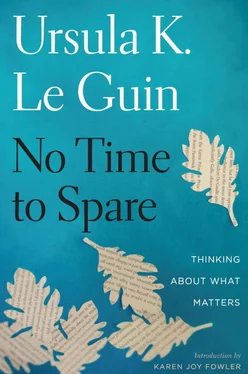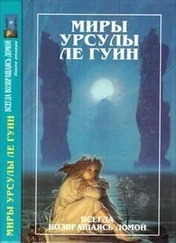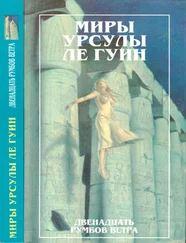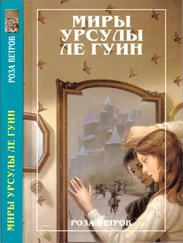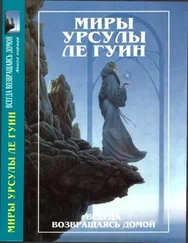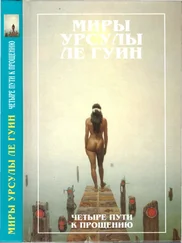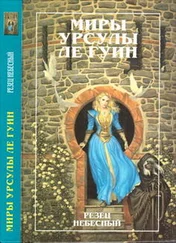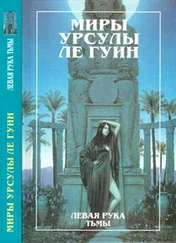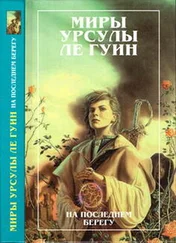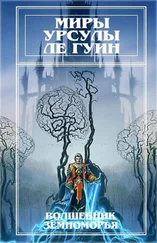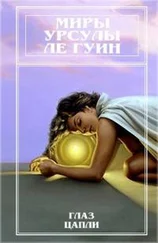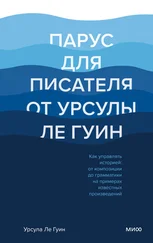I wish we were getting a little practice in such things. I wish our president would respect us enough to give us a chance to practice at least thinking about them.
I wish the ideals of respecting truth and sharing the goods hadn’t become so foreign to my country that my country begins to seem foreign to me.
The Inner Child and the Nude Politician
October 2014
LAST SUMMER A COMPANY that makes literary T-shirts asked me for permission to use a quote:
“The creative adult is the child who survived.”
I looked at the sentence and thought, Did I write that sentence? I think I wrote something like it. But I hope not that sentence. Creative is not a word I use much since it was taken over by corporationthink. And isn’t any adult a child who survived?
So I Googled the sentence. I got lots of hits, and boy were some of them weird. In many of them the sentence is ascribed to me, but no reference to a source is ever given.
The weirdest one is at a site called quotes-clothing.com:
MY DEAR,
The creative adult is the child who survived.
The creative adult is the child who survived after the world tried killing them, making them “grown up.” The creative adult is the child who survived the blandness of schooling, the unhelpful words of bad teachers, and the nay-saying ways of the world.
The creative adult is in essence simply that, a child.
Falsely yours, Ursula Le Guin
The oddest part of this little orgy of self-pity is “Falsely yours,” which I take to be a coy semiconfession of forgery by whoever actually wrote the rant.
I’ve looked through my own essays for the sentence that could have been used or misused for the quote, because I still have a feeling there is one. So far I haven’t found it. I asked my friends in an sf chat group if it rang any bell with them—some of them being scholars, with a keen nose for provenience—but none of them could help. If anybody reading this has a theory about the origin of the pseudo-quote, or better yet a Eureka! with volume and page citation, would you please post it as a response at BVC? Because it’s been bothering me ever since June. [4] Welcome responses to this blog post on Book View Café soon gave me both the sentence I wrote and a possible source of the misquotation. In the 1974 essay “Why Are Americans Afraid of Dragons?” (reprinted in the collection The Language of the Night ), I wrote: “I believe that maturity is not an outgrowing, but a growing up: that an adult is not a dead child, but a child who survived.” Nothing about “creativity” whatever. I was just hitting at the notion that maturity is mere loss or betrayal of childhood. The misquote may have first appeared on the Internet in 1999, in a huge and generally useful collection of quotations compiled by Professor Julian F. Fleron. When I wrote him, he was distressed to learn that it was a misquote, and most amiably removed it at once. But a false attribution on the Internet is like box elder beetles, the miserable little things just keep breeding and tweeting and crawling out of the woodwork. I checked just now (July 2016): Goodreads and AIGA continue to attribute the “creative adult” misquote to me. It has also taken on an independent existence, and is even referred to by one source as “the well-known saying.” Oh well!
The sentence itself, its use and popularity, bothers me even more. Indifference to what words actually say; willingness to accept a vapid truism as a useful, even revelatory concept; carelessness about where a supposed quotation comes from—that’s all part of what I like least about the Internet. A “blah blah blah, who cares, information is what I want it to be” attitude—a lazy-mindedness that degrades both language and thought.
But deeper than that lies my aversion to what the sentence says to me: that only the child is alive and creative—so that to grow up is to die.
To respect and cherish the freshness of perception and the vast, polymorphous potentialities of childhood is one thing. But to say that we experience true being only in childhood and that creativity is an infantile function—that’s something else.
I keep meeting this devaluation of growing up in fiction, and also in the cult of the Inner Child.
There’s no end of books for children whose hero is a rebellious misfit—the boy or girl (usually described as plain, and almost predictably red-haired) who gets into trouble by questioning or resisting or ignoring The Rules. Every young reader identifies with this kid, and rightly. In some respects, to some extent, children are victims of society: they have little or no power; they aren’t given the chance to show what’s in them.
And they know it. They love reading about taking power, getting back at bullies, showing their stuff, getting justice. They want to do so so that they can grow up, claim independence in order to take responsibility.
But there’s a literature written for both kids and adults in which human society is reduced to the opposition Kids Good/Creative, Adults Bad/Dead Inside. Here the child heroes are not only rebellious but are in all ways superior to their hidebound, coercive society and the stupid, insensitive, mean-minded adults that surround them. They may find friendship with other children, and understanding from a wise, grandparently type of another skin color or from people marginal to or outside their society. But they have nothing to learn from adults of their own people, and those elders have nothing to teach them. Such a child is always right, and wiser than the adults who repress and misunderstand him. Yet the super-perceptive, wise child is helpless to escape. He is a victim. Holden Caulfield is a model of this child. Peter Pan is his direct ancestor.
Tom Sawyer has something in common with this kid, and so does Huck Finn, but Tom and Huck are not sentimentalized or morally oversimplified, nor do they consent to be victims. They are described with, and have, a powerful sense of ironic humor, which affects the crucial issue of self-pity. The coddled Tom loves to see himself as cruelly oppressed by meaningless laws and obligations, but Huck, a real victim of personal and social abuse, has no self-pity at all. Both of them, however, fully intend to grow up, to take charge of their own lives. And they will—Tom no doubt as a successful pillar of his society, Huck a freer man, out there in the Territories.
It seems to me the Super-Perceptive Child Victim of Self-Pity has something in common with the Inner Child: they’re lazy. It’s so much easier to blame the grownups than to be one.
The idea that we all contain an Inner Child who has been suppressed by our society, the belief that we should cultivate this Inner Child as our true self and that we can depend upon it to release our creativity, seems an overreductive statement of an insight expressed by many wise and thoughtful people—among them Jesus: “Except ye be converted and become as little children, ye shall not enter the kingdom of heaven.”
Some mystics and many great artists, aware of drawing on their childhood as a deep source of inspiration, have spoken of the need to maintain an unbroken inner connection between the child and the adult in one’s own inward life.
But to reduce this to the idea that we can open a mental door from which our imprisoned Inner Child will pop out and teach us how to sing, dance, paint, think, pray, cook, love, etc. …?
A very wonderful statement of the necessity, and the difficulty, of maintaining a connection to one’s own child-self is Wordsworth’s “Ode on Intimations of Immortality.” The poem offers a profoundly felt, profoundly thoughtful, radical argument:
Our birth is but a sleep and a forgetting…
Читать дальше
